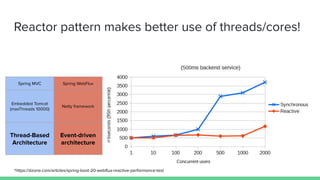What are the benefits of reactive programming in java
- 1. What are the benefits of reactive programming in Java? Dmytro Melnychuk
- 2. Bio Software Engineer ● 7 years experience in JVM languages twitter.com/meldmy github.com/meldmy
- 3. Agenda ● Synchronous vs asynchronous programming ● The key reactive programming concepts ● Current state of Java-based reactive frameworks and toolkits
- 4. Have you ever stayed in such long queue? The first McDonald's in Moscow opened in 1990
- 5. When can it happen?
- 6. When can it happen? When too many clients need to wait for finalization of their orders!
- 7. What is the problem with simple order system? We need to stay in queue until all previous orders complete * https://www.vintag.es/2016/03/old-mcdonalds-historical-photos-of.html
- 8. How they resolved a problem with a long queue? * https://www.calvertjournal.com/images/uploads/thumbnails/McDonalds/LON29289.jpg * https://external-preview.redd.it/x0cIVo6wWlM8ryudtVHhMmPwvnUkZxOg1_izN5fgwZ8.jpg?auto=webp&s=209c2937112562108309eb5b4b59165bc46c0fb9
- 9. The same problem with synchronous blocking I/O Blocking is waiting! Let’s remember! Waiting is doing nothing!
- 10. Let’s avoid doing nothing!
- 11. Freezing UI and our backend use blocking I/O
- 12. Let’s increase the number of server threads?
- 13. Let’s increase the number of server threads?
- 14. What's wrong with increasing threads and blocking I/O? ➢ Thread-per-connection approach ➢ Thread Context Switching
- 15. Thread-per-connection approach * http://www.coralblocks.com/index.php/thread-concurrency-vs-network-asynchronicity/ 1. Thread creating 2. Thread per connection 3. Waiting thread per Keep-Alive connection 4. Context Switching
- 16. Context Switching - cores switch between processes * http://www.coralblocks.com/index.php/thread-concurrency-vs-network-asynchronicity/
- 17. What about reactive programming?
- 18. What is reactive programming? Reactive programming - is a declarative programming paradigm concerned with data streams, the propagation of change [1] Reactive programming - is about non-blocking, event-driven applications that scale with a small number of threads [2] 1. https://en.wikipedia.org/wiki/Reactive_programming 2. https://spring.io/blog/2016/07/28/reactive-programming-with-spring-5-0-m1
- 19. How we can double every int in the array in Java? Imperative approach
- 20. How we can double every int in the array in Java?
- 21. How we can double every int in the array in Java? Imperative approach Declarative approach
- 22. Imperative vs declarative programming Imperative programming Declarative programming How you want to do What you want to do
- 23. Reactive programming is programming with data streams
- 24. Reactive programming concerned with data streams Data streams Non-blocking I/OBlocking I/O Synchronous Asynchronous java.util.stream.* java.util.concurrent.Flow (JDK 9)
- 25. Understand the term of propagation of change var A = 1, B = 2; var C = A + B; A = 3; print(C); //=> 5 What should we know about C behavior? ● C is automatically updated when values of A or B change ● C is a observer that subscribes to an observable A and B
- 26. Observable needs a small number of threads to scale
- 28. The reactor pattern (single-threaded event loop)
- 29. Is reactor pattern faster than one-thread-per-connection model?
- 30. Why do you think this happens? *https://dzone.com/articles/spring-boot-20-webflux-reactive-performance-test Spring MVC Spring WebFlux Embedded Tomcat (maxThreads 10000) Netty framework
- 31. Reactor pattern makes better use of threads/cores! *https://dzone.com/articles/spring-boot-20-webflux-reactive-performance-test Spring MVC Spring WebFlux Embedded Tomcat (maxThreads 10000) Netty framework Thread-Based Architecture Event-driven architecture
- 33. Reactive Java frameworks and toolkits Project Reactor

















![What is reactive programming?
Reactive programming - is a declarative programming
paradigm concerned with data streams, the propagation of
change [1]
Reactive programming - is about non-blocking, event-driven
applications that scale with a small number of threads [2]
1. https://en.wikipedia.org/wiki/Reactive_programming
2. https://spring.io/blog/2016/07/28/reactive-programming-with-spring-5-0-m1](https://image.slidesharecdn.com/whatarethebenefitsofreactiveprogramminginjava-191027213021/85/What-are-the-benefits-of-reactive-programming-in-java-18-320.jpg)

















